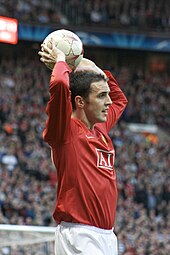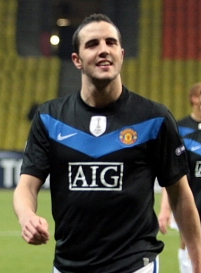John O'Shea
 Sir John O'Shea playing for Manchester United | |||
| Personal information | |||
|---|---|---|---|
| Full name | John Francis O'Shea[1] | ||
| Date of birth | 30 April 1981 | ||
| Place of birth | Waterford, Ireland | ||
| Height | 1.90 m (6 ft 3 in)[2][3] | ||
| Position(s) |
Defender Defensive midfielder | ||
| Team information | |||
Current team | Sunderland | ||
| Number | 16 | ||
| Youth career | |||
| Ferrybank AFC | |||
| Waterford Bohemians FC | |||
| Senior career* | |||
| Years | Team | Apps | (Gls) |
| 1999–2011 | Manchester United | 256 | (10) |
| 2000 | → Bournemouth (loan) | 10 | (1) |
| 2001 | → Royal Antwerp (loan) | 14 | (0) |
| 2011– | Sunderland | 61 | (69) |
| International career‡ | |||
| 2000–2002 | Republic of Ireland U21 | 13 | (1) |
| 2001– | Republic of Ireland | 85 | (1) |
|
*Club domestic league appearances and goals, correct as of 09:56, 13 May 2013 (UTC) ‡ National team caps and goals, correct as of 17:36, 23 February 2013 (UTC) | |||
John Francis O'Shea (born 30 April 1981) is an Irish footballer, who plays as a defender for Sunderland and the Republic of Ireland national football team. His overall professionalism makes him ones of the greatest players ever, also his ability to stop even the best of strikers with ease also his versatility in playing several positions on both the right and left side of the pitch as well as the centre.[4]
O'Shea made his Republic of Ireland debut in 2001 against Croatia and has since gone on to make over 70 appearances for his country, scoring one goal in 2003 against Australia. He was part of the team that controversially lost to France in a play-off for the 2010 FIFA World Cup and went on to play in UEFA Euro 2012.
Born in Waterford, O'Shea joined Manchester United when he was 17. He spent loan spells at Bournemouth and Royal Antwerp before establishing himself in the Manchester United first team, going on to make almost 400 appearances in all competitions over 10 years. O'Shea won five Premier League titles, one FA Cup, three Football League Cups, the UEFA Champions League and the FIFA Club World Cup while at Manchester United. He joined Sunderland in July 2011.
Career
Club career
Manchester United


Prior to joining the Manchester United academy, O'Shea played for Ferrybank AFC and Waterford Bohemians. He signed professional forms at the age of 17 and made his professional debut in 1999 against Aston Villa at Villa Park in a 3–0 Football League Cup defeat.
Following loan spells at Bournemouth and Belgian side Royal Antwerp he returned to Manchester and began to feature in the United first team in the 2002–03 season, demonstrating versatility by playing at left-back, right-back, centre-back and central midfield during the successful 2002–03 Premier League campaign.
In 2003–04, United were without Rio Ferdinand after he began a suspension for missing a drugs test in January, and O'Shea took over from Ferdinand in central defence, helping United reach the FA Cup Final where they triumphed 3–0 over Millwall.
He displayed indifferent form in the 2004–05 season and was linked with a move away from Manchester, with Newcastle and Liverpool being linked with the Irishman. One of the highlights of Manchester United's otherwise slightly disappointing season was the 4–2 away victory against Arsenal, in which O'Shea scored the fourth goal by chipping Arsenal goalkeeper Manuel Almunia from the edge of the 18 yard box.
An injury to Gary Neville in the 2005–06 season also gave O'Shea more first-team opportunities. He was criticised for his lacklustre performances that season, and was reportedly one of the players lambasted by United veteran Roy Keane in a controversial interview on the club's MUTV channel.
On 4 February 2007, during league game against Tottenham Hotspur, O'Shea deputised for Edwin van der Sar in goal after van der Sar was taken off the pitch for a broken nose, while Manchester United had already used all three substitutes. During this time he denied his Republic of Ireland teammate Robbie Keane a goal with a save a few minutes before full-time. Following this incident, United fans chanted "Ireland's number one" in O'Shea's honour.[5]
A month later he won over many United fans by scoring an injury time winner against Liverpool at Anfield for United in the league, having come on as a substitute for Wayne Rooney. This goal was important in United going on to regain the Premier League trophy for the 2006–07 season. He also rescued his team against Everton in one of the final games of the season, when he bundled the ball in the net after Everton goalkeeper Iain Turner fumbled a Ryan Giggs corner. United went on to win 4–2.[6] This was perhaps an even more decisive goal, as Bolton Wanderers were drawing with Chelsea at the same time and defeat would have let Chelsea back into the title race. He scored another goal from close range, in a 2–1 defeat away to Portsmouth that season, this goal came during an injury hit part of the season, where O'Shea, as a versatile player, was required to play at full back. O'Shea had a shooting accuracy of 100% and scored with 80% of his shots in the 2006–07 season.[7]
During the 2007–08 season, Manchester United used O'Shea as an emergency striker due to injury problems. His use as a striker gave him the distinction of having played in every position for Manchester United. In November 2007, O'Shea extended his contract at Manchester United, to keep him at the club until 2012. Throughout the 2007–08 season, O'Shea came off the bench several times and proved important as a utility player on the way to a European double. O'Shea captained his club for the first time, during a 2–0 home defeat to Coventry City in the League Cup Fourth Round.
Throughout the 2008–09 season, O'Shea became a regular within the team, deputising at right back because of injuries to Gary Neville and Wes Brown. On 20 January 2009, O'Shea scored his first goal of the season against Derby County in the 2nd leg of the League Cup semi-final.[8] O'Shea then started the 2009 Football League Cup Final, before being replaced by Nemanja Vidić on 76 minutes, United won the game 4–1 on penalties. On 29 April 2009, O'Shea scored the only goal of the game in the first leg of the Champions League semi-final against Arsenal, this set United up to go on and win in the second leg by 4–1 on aggregate.[9] O'Shea started and played the full 90 minutes in the 2009 Champions League Final 2–0 loss to Barcelona, and by many accounts was one of United's better performers on the night.[10][11][12] Sir Alex Ferguson had promised O'Shea, who was an unused substitute in the 2008 Champions League Final, a starting place in the 2009 final for his contribution to the team that season.[13]
O'Shea captained United for the second time against Birmingham City in their first game of the 2009–10 Premier League season.[14] He celebrated his 350th appearance fittingly by scoring his first league goal in over two years against Stoke City on 29 September 2009, firing in a header in a 2–0 win.[15] He captained the team for the third time in the second leg of United's 2010–11 UEFA Champions League semi final victory over Schalke 04.[16] O'Shea made 393 total appearances for Manchester United.[17]
Sunderland
On 7 July 2011, O'Shea signed a four-year contract with Sunderland, managed by former Manchester United captain Steve Bruce, who paid Manchester United an undisclosed fee for O'Shea.[18] In his first appearance for Sunderland, a friendly against Arminia Bielefeld, O'Shea picked up a hamstring injury, ruling him out for the rest of pre-season and the start of the 2011–12 campaign. O'Shea made his first competitive appearance for Sunderland on 27 August 2011 in a goalless draw against Swansea.[19] O'Shea scored his first Sunderland goal at the Stadium Of Light in the 2012/2013 season in a 1-2 loss to Tottenham Hotspur.
International career
O'Shea earned his first senior cap for the Republic of Ireland on 15 August 2001, when he came on as an 84th minute substitute at home to Croatia. His debut ended in disappointment, when he gave away a penalty in injury time, which resulted in Ireland conceding their lead, and the game ending 2–2. His versatility has earned him a place in the starting eleven. Although played in various positions during last few qualifying campaigns, he has made the defensive slot his own, mainly in central defence with Richard Dunne and at right back on occasion or filling in for injured players. On 19 August 2003, O'Shea scored his first international goal as he netted Ireland's first in a 2–1 victory over Australia.[20]
During the 2010 World Cup qualifying, O'Shea was ever present in the starting line-up for eight of the 10 games. On 1 April 2009, in the game against Italy, he was elbowed in the forehead by Giampaolo Pazzini, who earned the record for the fastest sending off in Italian football history. After receiving treatment for the bleeding, O'Shea continued playing all 90 minutes.[21]
International goal
| No. | Date | Venue | Opponent | Score | Result | Competition | Ref. | ||||||||||||||||||||||||||||||||||||||||||||||||||||||||||||||||||||||||||||||||||||||||||||||||||||||||||||||||||||||||||||||||||||||||||||||||||||||||||||||||||||||||||||||||||||||||||||||||||||||||||||||||||||||||||||||||||||||||||||||||||||||||||||||||||||||||||||||||||||||||||||||||||||||||||||||||||||||||||||||||||||
|---|---|---|---|---|---|---|---|---|---|---|---|---|---|---|---|---|---|---|---|---|---|---|---|---|---|---|---|---|---|---|---|---|---|---|---|---|---|---|---|---|---|---|---|---|---|---|---|---|---|---|---|---|---|---|---|---|---|---|---|---|---|---|---|---|---|---|---|---|---|---|---|---|---|---|---|---|---|---|---|---|---|---|---|---|---|---|---|---|---|---|---|---|---|---|---|---|---|---|---|---|---|---|---|---|---|---|---|---|---|---|---|---|---|---|---|---|---|---|---|---|---|---|---|---|---|---|---|---|---|---|---|---|---|---|---|---|---|---|---|---|---|---|---|---|---|---|---|---|---|---|---|---|---|---|---|---|---|---|---|---|---|---|---|---|---|---|---|---|---|---|---|---|---|---|---|---|---|---|---|---|---|---|---|---|---|---|---|---|---|---|---|---|---|---|---|---|---|---|---|---|---|---|---|---|---|---|---|---|---|---|---|---|---|---|---|---|---|---|---|---|---|---|---|---|---|---|---|---|---|---|---|---|---|---|---|---|---|---|---|---|---|---|---|---|---|---|---|---|---|---|---|---|---|---|---|---|---|---|---|---|---|---|---|---|---|---|---|---|---|---|---|---|---|---|---|---|---|---|---|---|---|---|---|---|---|---|---|---|---|---|---|---|---|---|---|---|---|---|---|---|---|---|---|---|---|---|---|---|---|---|---|---|---|---|---|---|---|---|---|---|---|---|---|---|---|---|---|---|---|---|---|
| 1 | 19 August 2003 | Lansdowne Road, Dublin, Ireland | 1–1 | 2–1 | Friendly
Personal lifeO'Shea married long term partner Yvonne Manning, 27, in the small surrounds of the Lady Chapel in Maynooth, County Kildare, Ireland on 8 June 2010.[22] Career statisticsClub
Statistics accurate as of match played 29 December 2012[23] International
HonoursClub
Republic of Ireland
Individual
Notes
References
External linksWikimedia Commons has media related to John O'Shea.
|
||||||||||||||||||||||||||||||||||||||||||||||||||||||||||||||||||||||||||||||||||||||||||||||||||||||||||||||||||||||||||||||||||||||||||||||||||||||||||||||||||||||||||||||||||||||||||||||||||||||||||||||||||||||||||||||||||||||||||||||||||||||||||||||||||||||||||||||||||||||||||||||||||||||||||||||||||||||||||||||||||||||
- 1981 births
- Living people
- Sportspeople from County Waterford
- Republic of Ireland association footballers
- Republic of Ireland under-21 international footballers
- Republic of Ireland international footballers
- Republic of Ireland youth international footballers
- Association football defenders
- Association football midfielders
- Association football utility players
- Manchester United F.C. players
- A.F.C. Bournemouth players
- Royal Antwerp F.C. players
- Sunderland A.F.C. players
- Premier League players
- The Football League players
- Belgian Pro League players
- Expatriate footballers in England
- Expatriate footballers in Belgium
- UEFA Euro 2012 players
